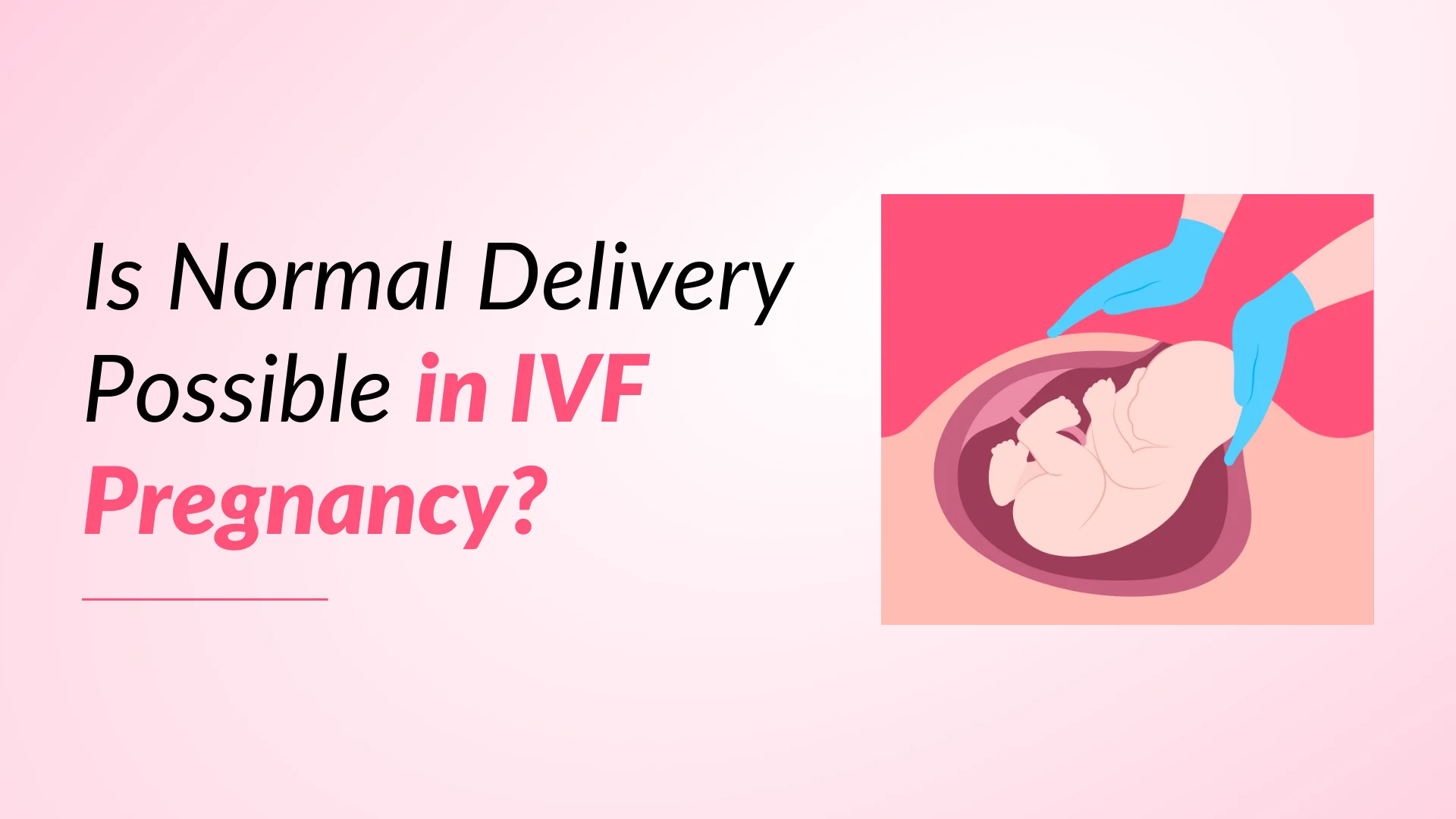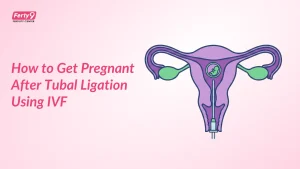When couples undergo IVF (In Vitro Fertilization), the joy of conceiving is often accompanied by concerns about the type of delivery. Is normal delivery possible in IVF pregnancy? This is a common question many IVF patients ponder. The perception that IVF pregnancies automatically require a cesarean section (C-section) often clouds the hope of experiencing a vaginal delivery.
Studies show that over 8 million children have been conceived through IVF, and with advancements in medical care, the delivery process has become safer for both mother and baby. While IVF pregnancies come with certain unique considerations, many women can have a vaginal birth. If you’re an IVF mother wondering about the possibility of a normal delivery, this blog aims to provide you with clear answers and insights.
Related read: Steps to Take Before Starting IVF Treatment
Understanding IVF Pregnancy
IVF pregnancy differs from natural conception in its method but not in its development. The fertilized embryo is implanted into the uterus, and from there, the pregnancy progresses as it would naturally. However, because IVF pregnancies are often achieved after years of trying and significant medical intervention, they are usually classified as high-risk.
For a more accurate prediction of your timeline, try our IVF Due Date Calculator to plan your next steps
Doctors closely monitor these pregnancies to ensure the safety of the mother and child. While extra care is necessary, it doesn’t mean that all IVF pregnancies must end in a cesarean delivery. With proper health management, IVF pregnancy and normal delivery can go hand in hand.
Also read: 10 Must-Know Facts About IVF
Can You Have a Normal Delivery After IVF?
The short answer is yes, normal delivery in IVF pregnancy is possible. The mode of delivery depends on various factors, including the mother’s health, the baby’s position, and the pregnancy’s overall progress. Many women who conceive through IVF successfully deliver vaginally.
Contrary to common belief, undergoing IVF doesn’t inherently eliminate the possibility of a vaginal birth. What’s important is regular prenatal care, open communication with your doctor, and staying informed about your specific condition.
Factors That Influence Delivery Type in IVF Pregnancies
Several factors can influence whether a woman who has undergone IVF can have a normal delivery:
- Age of the Mother : Advanced maternal age can sometimes necessitate a C-section, as it increases the likelihood of complications like high blood pressure or gestational diabetes.
- Single vs. Multiple Pregnancies : IVF often leads to twin or triplet pregnancies, which can increase the need for a cesarean delivery. However, for single pregnancies, the chances of normal delivery in IVF are higher.
- Baby’s Position : If the baby is in a head-down position close to delivery, a vaginal birth is more likely.
- Placental Health : Placenta previa (where the placenta blocks the cervix) can make vaginal delivery unsafe.
- Underlying Health Conditions : Conditions such as hypertension, diabetes, or fibroids can influence the decision towards a cesarean section.
- Fetal Health : Any concerns about the baby’s health or position (e.g., breech position) may lead doctors to opt for a C-section.
- Previous C-section: Women who have had a previous C-section may be more likely to have another C-section, although vaginal birth after cesarean (VBAC) is sometimes possible.
What Are the Risks of Normal Delivery in IVF Pregnancies?
While normal delivery in IVF is possible, it does come with certain risks:
- Preterm Labor : IVF pregnancies sometimes have a higher chance of premature delivery, which can complicate normal delivery.
- Placental Issues : There is an increased risk of placental issues, such as placenta previa or placental abruption, which can make vaginal delivery risky.
- Uterine Scarring : If there’s a history of uterine surgeries or complications, a C-section might be recommended.
However, with advanced medical care and constant monitoring, these risks can be managed effectively.
Advantages of Normal Delivery After IVF
Having a vaginal delivery after IVF offers multiple benefits:
- Quicker Recovery : Normal delivery allows faster recovery compared to a C-section.
- Lower Surgical Risks : Avoiding surgery minimizes the risk of infections and complications.
- Emotional Satisfaction : For many mothers, vaginal delivery is an emotionally fulfilling experience.
- Immediate Bonding : Mothers can bond with their babies immediately after birth, enhancing early breastfeeding and bonding experiences.
- Shorter Hospital Stay : Women who have a normal delivery typically have a shorter hospital stay, allowing them to return home sooner.
For mothers who ask, “Is it possible to have normal delivery in IVF?” these advantages serve as motivation to aim for a vaginal birth if their health permits.
When is C-Section Necessary in IVF Pregnancy?
Sometimes, despite the mother’s desire for a vaginal birth, a cesarean delivery becomes essential for safety reasons.
- Multiple Pregnancies : Twins or triplets are often delivered via C-section to prevent complications.
- Baby’s Position : If the baby is positioned feet-first or sideways in the womb (breech or transverse presentation), a C-section may be necessary for safe delivery.
- Health Complications : Conditions like preeclampsia or gestational diabetes can make a C-section the safer option.
- Labor Complications : Prolonged or stalled labor may also necessitate surgical intervention.
In such cases, the priority is always the health of the mother and baby. Even if normal delivery in IVF isn’t possible, the focus remains on ensuring a safe and successful delivery.
What to Expect During Labor for IVF Pregnancies?
Labor for IVF pregnancies is similar to that of naturally conceived pregnancies, but there might be additional monitoring. If you’re planning for a vaginal birth, your doctor will monitor:
- Contractions and dilation of the cervix.
- Baby’s heart rate to ensure there’s no distress.
- Progression of labor to decide if intervention is needed.
IVF patients often experience induction of labor, especially if the pregnancy has gone beyond the due date.
Post-Delivery Care for IVF Mothers
Whether the delivery is vaginal or surgical, post-delivery care is vital for IVF mothers. After IVF pregnancy and normal delivery:
- Take adequate rest to recover from labor.
- Follow a nutritious diet to regain strength.
- Attend postpartum check-ups to ensure both physical and emotional well-being.
- If breastfeeding, consult a lactation expert for guidance.
IVF pregnancies are often emotionally and physically demanding, so postnatal support is crucial to ease the transition into motherhood.
Find Hope and Solutions for Female Infertility and Male Infertility — Explore Our Comprehensive Services IUI Treatment
ICSI Treatment
PICSI Treatment
Fertility Preservation Service
Blastocyst Culture & Transfer Treatment
Genetic Screening & Testing
Conclusion
To answer the question, “Is normal delivery possible in IVF pregnancy?” – Yes, it is absolutely possible under the right conditions. With proper medical care, many women successfully experience vaginal births even after IVF.
If you’re an IVF patient, discuss your options with your doctor and remain optimistic. At Ferty9 Fertility Center, we are committed to guiding you through every step of your IVF journey, ensuring the best care and support. Book a consultation today to explore how we can assist you in achieving a safe and healthy delivery.





























